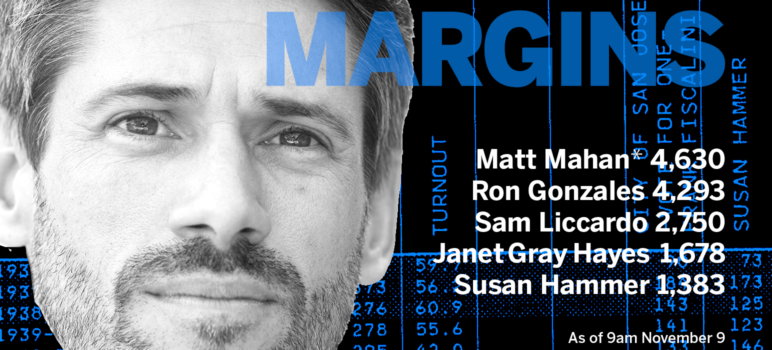San Jose, a million-person city in which a fifth of its residents choose the mayor, has a history of close elections. Only three of the past seven open elections could be called lopsided victories.
The last time an open seat was decided in one round was 40 years ago, in 1982—the year 39-year-old Matt Mahan was born. In that race, Tom McEnery beat Claude Fletcher in the primary with 56% of the vote.
Norm Mineta had done the same thing 11 years earlier, outdistancing 14 other candidates in June with 62% of the vote.
Mineta’s successor, Janet Gray Hayes, defeated police detective Barton Collins in 1974 by 1,678 votes, a slim 1.3% margin.
In 1990, Susan Hammer squeaked by Frank Fiscalini with just a 1,383 vote edge, less than 1 percent of the 177,415 votes cast. The election was so close it took days to declare the winner.
Ron Gonzalez bested Pat Dando by 4,293 votes in 1998, just 2.35% of the vote in an election in which 197,814 mayoral votes were counted.
Sam Liccardo beat Dave Cortese by a point and a half— 2750 votes in an election in which the two candidates collected 180,930 votes.
The biggest margin in decades was when Chuck Reed won a nearly 60-40 victory over Cindy Chavez in 2006, with a 36,674 vote margin.
As of Wednesday morning, Mahan had a lead of 4,630 votes, more than the vote counts by which Hayes, Hammer, Gonzales or Liccardo secured their mayorships.
If Mahan prevails, it will be the second time Chavez has entered an election as a frontrunner and benefited from a 2-to-1 spending advantage, including independent expenditures, only to lose the contest in November.
Chavez backers, including labor unions and the 49ers, spent more than $5 million in this year’s races, in which total spending by Chavez and Mahan funders exceeded $8 million.
Mahan joins Norm Mineta and Tom McEnery as San Jose mayors elected in their 30s.
Mahan could serve up to ten years instead of the usual term-limited eight. Due to a realignment of mayoral contests with presidential years to improve voter participation, Mahan could collect two bonus years if he is confirmed this time around and wins re-election in 2024.


Cindy. Two time loser. Go back to Hayward.